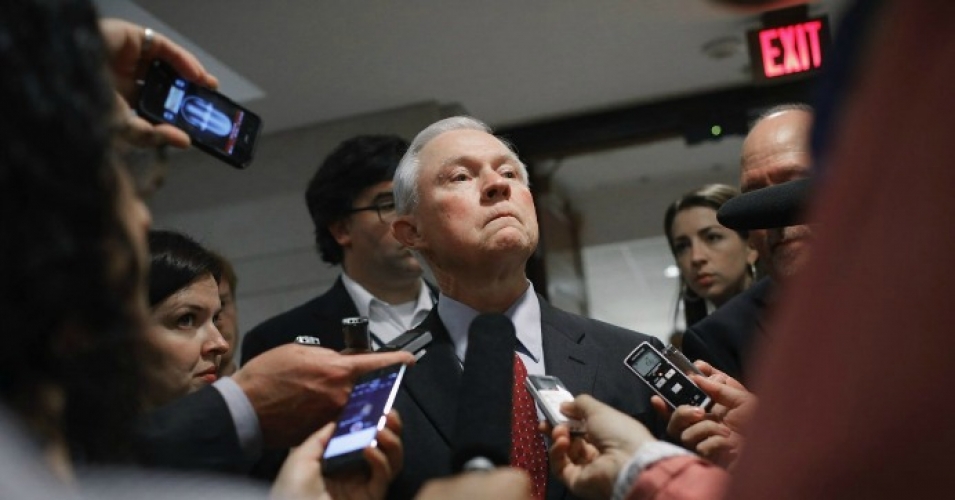
Sessions’ reputation as a “rubber stamp” for Trump and his policies drew fire during Tuesday’s committee vote, and has sowed fear among those concerned over the troubling consolidation of power within the new administration: Chip Somodevilla/Getty Images
UPDATE: After this story was published, the U.S. Senate Judiciary Committee voted on Tuesday to confirm Senator Jeff Sessions as attorney general of the United States, sending President Donald Trump’s pick to be the nation’s top law enforcement officer to the full Senate for a final vote.
By Lauren McCauley –
WASHINGTON, D.C. — Democrats on the Senate Judiciary Committee invoked a procedural action called the two-hour rule during confirmation hearings on Tuesday for President Donald Trump’s pick for attorney general, Senator Jeff Sessions of Alabama, delaying the vote until Wednesday.
The move stalls the controversial confirmation of Sessions and came at the same time that Democrats on the Senate Finance Committee boycotted hearings for Treasury Secretary nominee Steven Mnuchin and House Member Tom Price’s nomination as secretary of health and human services, forcing Republicans to reschedule both votes.
Tuesday’s hearing was held hours after acting Attorney General Sally Yates was fired by Trump for refusing to enforce an immigration order she deemed unlawful.
During Yates’ 2015 confirmation hearing, Sessions had specifically asked her: “If the views the President wants to execute are unlawful, should the attorney general or the deputy attorney general say no?”
Growing concern that Sessions himself would act as “rubber stamp” for Trump and his policies — as well as his record of opposing rights for women, minorities, and the LGBTQ community — were the basis of many questions during Tuesday’s committee hearing, and has sowed fear among those concerned over the troubling consolidation of power within the new administration.
Before voting against his confirmation, Senator Patrick Leahy, a Democrat from Vermont, called out Sessions’ troubling devotion to Trump and noted that even Trump’s senior advisor Stephen Bannon called Sessions the “administration’s clearing house for policy and philosophy.”
That quote came from an email to Washington Post reporters Philip Rucker and Robert Costa, who on Monday reported that Sessions was considered the “intellectual godfather…of Trump’s hard-line actions.”
“The early days of the Trump presidency have rushed a nationalist agenda long on the fringes of American life into action—and Sessions, the quiet Alabamian who long cultivated those ideas as a Senate backbencher, has become a singular power in this new Washington,” they wrote:
From immigration and health care to national security and trade, Sessions is the intellectual godfather of the president’s policies. His reach extends throughout the White House, with his aides and allies accelerating the president’s most dramatic moves, including the ban on refugees and citizens from seven mostly Muslim nations that has triggered fear around the globe.
The author of many of Trump’s executive orders is senior policy adviser Stephen Miller, a Sessions confidant who was mentored by him and who spent the weekend overseeing the government’s implementation of the refugee ban. The tactician turning Trump’s agenda into law is deputy chief of staff Rick Dearborn, Sessions’s longtime chief of staff in the Senate. The mastermind behind Trump’s incendiary brand of populism is chief strategist Stephen K. Bannon, who, as chairman of the Breitbart website, promoted Sessions for years.
During Tuesday’s debate, Senator Dianne Feinstein, a Democrat from California, pointed out that “Trump repeatedly referred to Sessions as ‘my Attorney General,'” to which she added: “How could we possibly conclude that this nominee will be independent?”
Before the hearing, a coalition of progressive organizations had petitioned committee chairman Charles Grassley, a Republican from Iowa, to delay the scheduled vote until Sessions clarified his stance on the temporary ban on citizens from seven predominantly Muslim countries.
The hearing was met with numerous disruptions from protesters, including from former U.S. Army colonel and CODEPINK activist Anne Wright, who was arrested after speaking out.
Meanwhile, outside the Dirksen Senate Office Building where the hearing was held, protesters rallied against Sessions and vowed retribution against lawmakers who backed his nomination.
On Monday, 11 members of the NAACP, including the organization’s president Cornell Brooks, were arrested for staging another sit-in outside Sessions’ Senate office in Mobile, Alabama.
“I think it’s clear that this administration is picking a fight with the American citizenry and the citizenry is making it clear that we’re not backing down; we’re not relenting,” Brooks said. “The choice before us is not between liberalism and conservatism, but authoritarianism and democracy.”
Widespread opposition to Trump’s cabinet, particularly Sessions, and anger over what many has perceived as lackluster resistance on the part of Democratic lawmakers has pushed many party leaders to preemptively announce they would not vote for his approval.
Senate Minority leader Chuck Schumer announced in a Facebook post on Monday that he would not vote for Sessions, among other nominees. Confronted by angry constituents, Senator Sheldon Whitehouse of Rhode Island late Sunday also said Sessions would not get his vote. Al Franken of Minnesota has also said he would not vote for Sessions.
Will the Republicans simply rubber stamp Trump’s radical appointements, or stand up to the new president so protect their own seats from massive opposition in the mid-term elections? Can Democrats use the anti-democratic actions of the new administration to retake control of Congress in two years?
If the Judiciary Committee approves Sessions’ nomination, which seems likely, the battle will move to the full Senate, where activist vow to hold each individual Senator accountable for their vote.
—
A version of this story first appeared on the news website of Common Dreams, and is republished here in edited form under a Creative Commons License.













